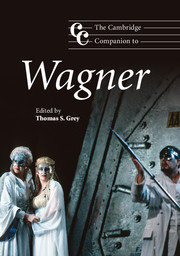Book contents
- Frontmatter
- PART I Biographical and historical contexts
- PART II Opera, music, drama
- PART III Ideas and ideology in the Gesamtkunstwerk
- PART IV After Wagner: influence and interpretation
- 13 “Wagnerism”: responses to Wagner in music and the arts
- 14 Wagner and the Third Reich: myths and realities
- 15 Wagner on stage: aesthetic, dramaturgical, and social considerations
- 16 Criticism and analysis: current perspectives
- Notes
- Select bibliography
- Index
16 - Criticism and analysis: current perspectives
from PART IV - After Wagner: influence and interpretation
Published online by Cambridge University Press: 28 September 2011
- Frontmatter
- PART I Biographical and historical contexts
- PART II Opera, music, drama
- PART III Ideas and ideology in the Gesamtkunstwerk
- PART IV After Wagner: influence and interpretation
- 13 “Wagnerism”: responses to Wagner in music and the arts
- 14 Wagner and the Third Reich: myths and realities
- 15 Wagner on stage: aesthetic, dramaturgical, and social considerations
- 16 Criticism and analysis: current perspectives
- Notes
- Select bibliography
- Index
Summary
Wagner's prominence on the present-day musical scene is due primarily to the continued commitment of performers, and of the promoters and producers of opera who employ them. As the second centenary of his birth approaches, stagings of Wagner's works show no signs of failing to attract large audiences; the demand for tickets for Bayreuth is currently as great if not greater than at any time in the festival's history. Wagner the cultural phenomenon also remains a subject of immense interest to writers and scholars of all kinds. Alongside the definitive edition of his compositions which commenced publication in 1970 (Richard Wagner: Sämtliche Werke), there is an ongoing edition of his complete correspondence (Sämtliche Briefe), a magisterial catalogue of works (Wagner Werk-Verzeichnis), and a multitude of commentaries for specialists and non-specialists alike. Such commentaries are especially valuable in helping to illuminate the increasingly distant world in which Wagner lived and worked. With such reliably authentic texts established or in progress, specialized research on Wagner continues to probe those texts for meaning and significance. The emphasis may be on essentially musical or more broadly cultural matters, but the primary objective is to explain the continued importance of Wagner and his works to the contemporary world.
- Type
- Chapter
- Information
- The Cambridge Companion to Wagner , pp. 276 - 289Publisher: Cambridge University PressPrint publication year: 2008

